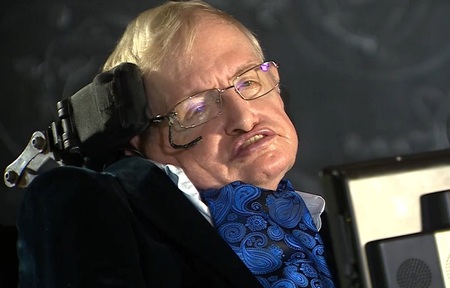Stephen Hawking: Man of brilliance and possibility
Tributes are being paid to internationally celebrated physicist Stephen Hawking who died at his home at the age of 76, but doctors initially gave him only three years to live when he was 21.

Diagnosed with motor neurone disease at this young age, Stephen Hawking surpassed the expectations of his doctors and the world as he pushed the boundaries of what many thought was possible in relation to physics and his own health. He showed that disability does not mean inability.
Motor neurone disease (MND), also known as Amyotrophic Lateral Sclerosis (ALS) is a rare condition that affects the brain and spinal cord. It harms the nerves controlling the body’s movement and can affect arms, legs, speech, swallowing or the ability to breathe. There is no cure.
’Brilliance…wonder…sense of possibility'
Professor Brian Cox, speaking on BBC Radio 4’s Today programme, said Stephen Hawking may have been in a wheelchair but “the realisation that he may not have long to live…stimulated him to go more deeply into physics.
“The thing that most inspired me, when I read his book when I was 20 years old when ‘A Brief History Of Time’ came out, was that mixture of brilliance in physics but also that sense of wonder"… "and that sense of possibility.”
Stephen Hawking studied physics in Oxford and went to Cambridge for his postgraduate research in cosmology. Married to his first wife for 26 years, they had three children.
Professor Hawking became famous in 1988 after publishing his book ‘A Brief History of Time’, which sold over 10 million copies. He married his home care nurse Elaine Mason in 1995. Their marriage lasted 11 years before they divorced.
In a wheelchair, Professor Hawking was unable to speak except through a computerised voice synthesiser. His life story was made into the 2014 film, 'The Theory of Everything', starring Eddie Redmayne, who won an Oscar for Best Actor for his portrayal of the English physicist.
Upon hearing of Professor Hawking's death, the actor paid tribute to him with the words: "We have lost a truly beautiful mind, an astonishing scientist and the funniest man I have ever had the pleasure to meet.
"My love and thoughts are with his extraordinary family."
'Not be much of a universe, if it wasn't home to people you love'
 Professor Hawking’s children Lucy, Robert and Tim confirmed the news of his death at his home in Cambridge on the morning of 14 March.
Professor Hawking’s children Lucy, Robert and Tim confirmed the news of his death at his home in Cambridge on the morning of 14 March.
His family's statement read:
'We are deeply saddened that our beloved father passed away today. He was a great scientist and an extraordinary man whose work and legacy will live on for many years.
'His courage and persistence with his brilliance and humour inspired people across the world. He once said: "It would not be much of a universe if it wasn't home to the people you love." We will miss him forever.'
Prime Minister Theresa May described Professor Hawking as “one of the great scientists of his generation" whose "courage, humour and determination to get the most from life was an inspiration".
As a theoretical physicist, it was Professor Hawking who worked out black holes emit radiation. Memorable quotes from him include his thoughts on black holes. In ‘The Nature Of Space And Time’, published in 1996, he stated:
'Einstein was wrong when he said, "God does not play dice". Consideration of black holes suggests, not only that God does play dice, but that he sometimes confuses us by throwing them where they can't be seen'.
In ‘A Brief History Of Time’, he discussed the prospect of the end of the universe by stating: ‘It will take about a thousand million million million million years for the Earth to run into the sun, so there's no immediate cause for worry.’
’Don’t be disabled in spirit’
Professor Hawking also had advice for those living with a disability.
"My advice to other disabled people would be, concentrate on things your disability doesn't prevent you doing well, and don't regret the things it interferes with”, he said, speaking to the New York Times.
“Don't be disabled in spirit, as well as physically", he added.
Professor Hawking once said: “I have been very lucky that my disability has not been a serious handicap. Indeed it has probably given me more time than most people to pursue the quest for knowledge.
“So remember to look up at the stars and not down at your feet. Try to make sense of what you see. Be curious. However difficult life may seem, there is always something you can do and succeed at.
"It matters that you don’t just give up.”
Latest Features News
 28-Nov-19
2019 Election: Labour pledges £10.8 bn for free personal care while Boris Johnson sidelines social care
28-Nov-19
2019 Election: Labour pledges £10.8 bn for free personal care while Boris Johnson sidelines social care
 18-Oct-19
Podcast: Wendy Mitchell and dementia: 'My biggest fear is not knowing who my daughters are'
18-Oct-19
Podcast: Wendy Mitchell and dementia: 'My biggest fear is not knowing who my daughters are'
 30-Sep-19
World's oldest diver aged 96 says 'never accept the fact you are getting old'
30-Sep-19
World's oldest diver aged 96 says 'never accept the fact you are getting old'
 27-Sep-19
Exclusive: Care minister backs care workers' call for time off to grieve and attend funerals
27-Sep-19
Exclusive: Care minister backs care workers' call for time off to grieve and attend funerals
 20-Sep-19
Podcast: Gyles Brandreth urges care workers to learn poetry with elderly
20-Sep-19
Podcast: Gyles Brandreth urges care workers to learn poetry with elderly